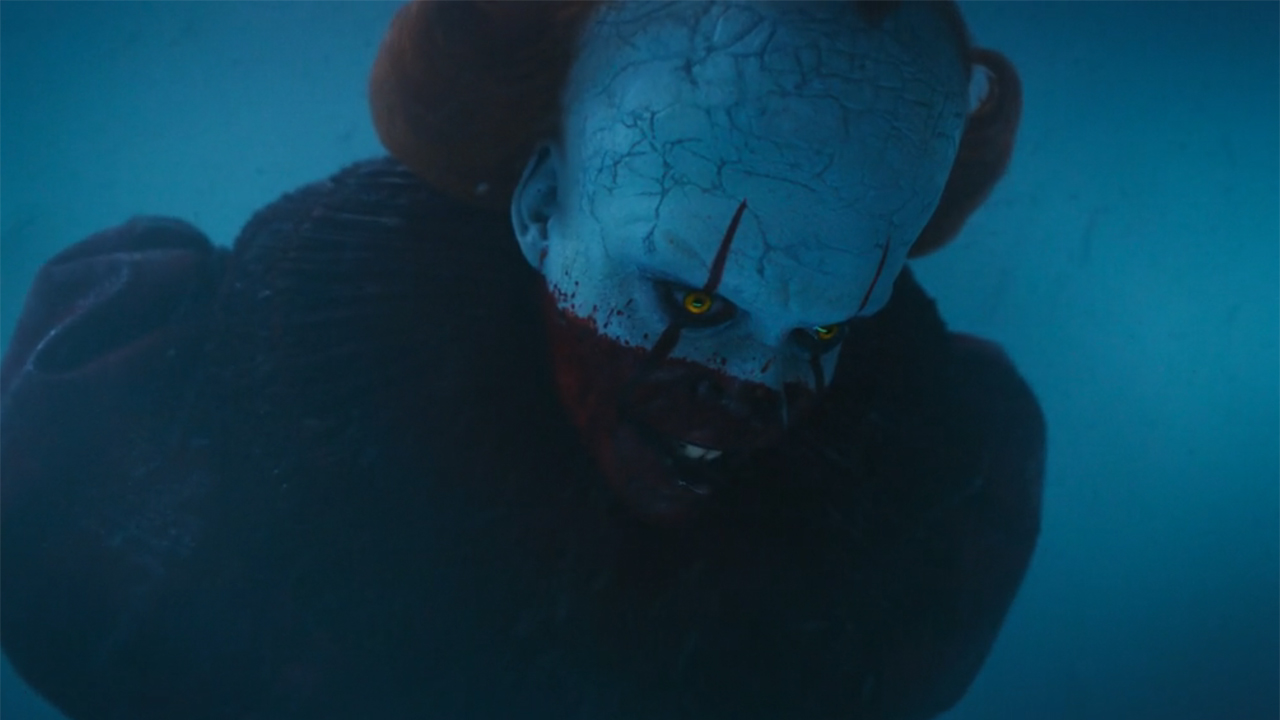Interview: Your Highness' Danny McBride And James Franco
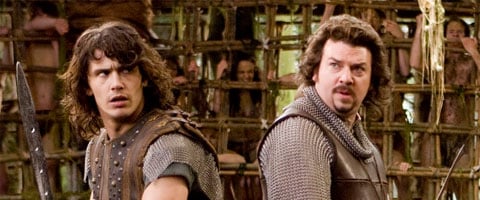
After the surprising success of Pineapple Express back in 2008, audiences gleaned two things: 1) James Franco needs to do more comedy and 2) Danny McBride needs to be in more movies. Just our luck, three years later we have Your Highness arriving in theaters.
Paired together, both Franco and McBride were kind enough to sit down with members of the press last week to talk about their newest film, which hits theaters tomorrow. Check out the interview below, in which McBride talks about his Lethal Weapon-esque mullet, Franco talks about his stacked workload, and much more.
Which scene, there's got to be one that was worse for you guys cracking up and you almost couldn't get through because it's so freaking hilarious. But which scene do you remember that you just couldn't nail it because it was so darn funny?
Danny McBride: You know, surprisingly, the scene that I couldn't get through was the scene I had with Natalie [Portman] where we were sitting at this table in this tavern and I have to confront her about stealing this compass. And the whole time that David Gordon Green directs, he's literally right out of frame of the camera. He just stands there and makes you say the most ridiculous things and you can't really hesitate, you have to just keep on going with it. And in the scene he's like "Call her a bully and a whore." And so I just started doing it without thinking but as soon as I looked at Natalie and the word "whore" came out I just felt horrible. I couldn't get through it, I just had to keep going through it over and over and that weirdly was the hardest thing.
James Franco: I think we had a hard time with the wise wizard too. We were acting with a puppet and I remember -- and we were short on time that day so it was actually a problem that--
Danny McBride: We couldn't finish it.
James Franco: So that was the scene.
Your Daily Blend of Entertainment News
Danny, with your historical research did you find that the mullet was a common hairstyle in the Middle Ages?
Danny McBride: Well historical accuracies were very important to us in this film. We really wanted to make this an educational film for kids that people back in the Middle Ages, when there were two moons, look just like people do now. And we really kind of were modeling that haircut off of Mel Gibson's Lethal Weapon. That's what we were kind of going for with that haircut yeah.
So it was the 1480s.
Danny McBride: Yes. They rocked the Mel Gibson Lethal Weapon haircut, yes.
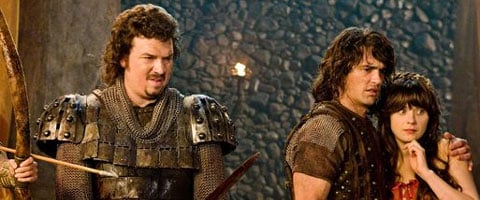
Can you talk about the comedic structure and why is it typical for this kind of comedy, what it adds to make it funny? Also any wizard weed that inspired your writing on this?
Danny McBride: You know I don't tend to partake in much "wizard weed" when I work on scripts. It’s such a hard process and if you want to do it good it seems like, if you do partake in a lot of that, people don't want to watch the things that you come up with when you've done that. With this film it was really important for David and I – when we were coming up with the idea – we only thought the comedy would work if the movie itself was approached as a serious fantasy film, and that's where we made the comedy.
To us when it came time to cast the film, even with the craftsman that we pulled onto the film, the guy who designed the weapons designed the weapons for like Braveheart. You know our production designer worked for Danny Boyle and the person who designed the armor designed the armor for Kingdom of Heaven. And so we really just approached the movie as if it were a serious epic fantasy and we just found the comedy in the fact that the more serious we took the movie, the more the comedy seemed to work. So in the writing of it we thought of it as a comedy second and as an adventure movie first. Then we tried to find that humor on the set.
You're talking about David telling you to say certain lines and stuff like that. Was there a lot of improv going on or not that much or...?
Danny McBride: There was a tone. The way – I worked with David a few times before and even the way we worked on Pineapple [Express] or even the stuff we've done on Eastbound [and Down] – we always tend to do one or two takes of what's on the page and then from there David just gets in there and we just start pushing it. And it’s not always even just to find jokes, we'll just improv so that everyone on the scene is just one their toes. You find that reaction that you couldn't have gotten when the actor knew exactly what was coming next. So improving is essential to what we do and there's a ton of it in there, right James?
James Franco: Yeah. And David, like Danny's saying, it's… when you have a movie that where you improvise during every scene, it's not just about finding funny lines like Danny is saying, it does something to the actors because you're more aware because you don't know what's coming next so you don't get lulled into a way of doing the scene the same way one time after another. So you're much more aware, and it does something to the behavior. It makes it more immediate, it makes it more alive. And then, you know, David won't have you just improvise different lines, he'll have you say it in very weird ways like say it like a robot or say it like you were taking a big dump.
Danny McBride: That was the direction he gave to Charles Dance at one point and it was very funny to see his reaction. He was kind of like, "What did I sign up for?"
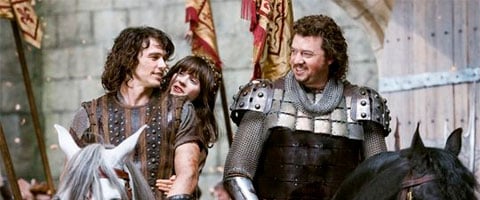
When you're dealing with humor this raunchy some of it is really subtle and some of it is really not so subtle. Was there anything you were particularly surprised at that you got away with and can you talk a little about the guy who played Courtney, cause he was just great.
Danny McBride: Yeah, Courtney was played by Rasmus Hardiker and it was one of those deals with him where we had been auditioning all the guys for Courtney. As soon as we saw him, before he even came into the room, we were just -- you kind of already know that this is our guy. He was sitting in the waiting room and out of all of these people we could identify that that was going to be our guy. He's comedicly just brilliant, he's fast on his toes. He just killed that role, he was a lot of fun to work with. What was the first part again?
Just if there was anything you were really surprised with actually getting away with.
Danny McBride: Well the fact that we made this movie was very surprising to us. David and I the whole time never really were convinced that somebody would make this movie . I mean to us it was just this wild idea, this crazy movie that we wished Hollywood would take more chances and make crazier things. To us that what it was, it was an opportunity to make a film that just seemed so specific to what we kind of wanted to see. We were surprised that someone was going to let us do that and there's tons of things that are in there. I think we have, it’s the first minotaur erection that has ever been filmed before. It has never -- we've made cinematic history. A lot of people have tried and haven't been able to accomplish it but we did it, we did it.
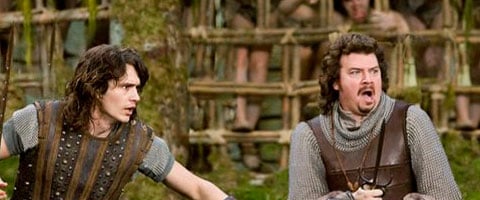
One of my favorite characters in the film was Simon the flying bird. I have to ask two questions, one is did you guys grow up playing D&D at all and was that sort of the influence. And obviously having grown up in the eighties there's films like Ator or Krull. Can you talk about maybe some of the movies you've watched for research?
Danny McBride: Yeah, you know David Green and myself went to film school together. I was a freshmen and he was in his second year of film school and we both lived in the same dorm. I met him the first week I was going to school there. When you go to film school, you've got all these guys who are trying to show everyone how smart they are. When they talk about movies its all of these pretentious arthouse films because they think those are the kinds of movies you have to like if you're going to film school. One of the things that David and I kind of instantly clicked on was that we appreciated those films but at the same time appreciated movies like Beastmaster, Krull and Dragonslayer, these fun movies that capture your imagination when you're a kid.
So it was awesome to be able to actually try to make one of those movies. It just gave me a very good excuse to my wife as to why I needed to be watching Krull on repeat at the time, because I couldn't have gotten away with it unless I was getting paid for it. It was a selfish reason to make this film.
James, do you have any eighties influence on this?
James Franco: Yes, the first thing I ever saw in a movie theater when I was very young was The Dark Crystal and I would see that repeatedly in the theater, then The Neverending Story and the original Clash of the Titans.
Those are some good ones, though they're a little hokey.
James Franco: They're a little hokey now, but still have a lot of charm.
Danny, I have to ask you, if you ever cleaned up your act to be the hero for a woman, you don't have to mention names, but have you ever felt like "You know, I've got to clean it up for this one."
Danny McBride: Well, you know, despite how I come across on screen my act is pretty clean. I tend to play it clean and I got married last October, so I have cleaned my act up.
I didn't mean that kind of clean, I just mean like be more polite, open doors and that kind of stuff.
Danny McBride: Yeah, I was born in the South and was raised to respect ladies and to be a gentleman so that was something that has always been important to me.
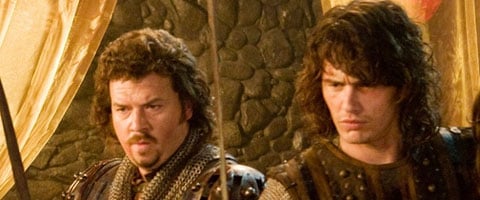
How challenging was it to pitch this script?
Danny McBride: You know the first day we pitched this script, we came in and pitched it as this is Krull meets Barry Lyndon, and the executives were like never pitch this movie like that ever again [laughs]. But to us that is what it was, I mean we wanted to approach it as a serious drama but at the same time have that fun that we had with a movie like Krull. You know that was always what the concept was, and that was what was interesting about taking on this project was like “Can you make a legitimate fantasy adventure movie like this and still find a way to find comedy in it without making it a spoof?” I think that's what interested me in creating it from the beginning, was this will be something that will be interesting to try.
James, the level of your prolific work lately has become so well known, to the point that they even spoofed it on Saturday Night Live.
James Franco: Not very well though, that guy didn't look like me at all [laughs].
How do you feel about the way the public perceives your prolific work?
James Franco: Well, it's hard, it's out of my hands really. You know I really went to school for yself, and sometimes I forget that it's actually not a public act. I'm there just to learn and better myself and that part of my life is not a performance, but in some ways it kind of has become material for public discussion to the point where the New York Times is interviewing my teachers. But, I don't mind, I mean I'm proud of everything I'm doing. So, I don't know, I guess it's just that part of my life is a performance and I perform as a job, and then part of it's kind of not. But what can you do? I can't control it.
But also directing films, and coming out with three or more movies a year.
James Franco: Well there's also this phenomena where people do like to announce movies that they think I'm doing that I'm not. I mean somebody just doesn't have the time to do all of the movies that people claim that I'm going to do. Or I have acquired the rights to a lot of books that I love and I think it helps the writers to sell their books if they announce my attachment, but it doesn't mean that I am going to make the movies in the next year, or two, or three.
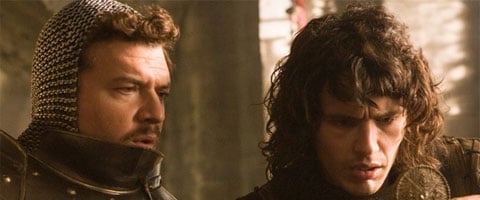
I wanted you guys to talk a little bit about Natalie Portman and how she kind of fit into your group of merry men.
Danny McBride: Well you know David [Gordon Green] had been in talks with Natalie about another project and once we started getting some movement on Your Highness it looked like that's what was going to be next. In his conversations with Natalie she kind of brought up this project and was saying she was dying to do a comedy and really wanted a chance to work with us and we were thrilled by that, because having actors like James [Franco] and Natalie is what separates this movie. It's not a movie that's filled with your typical comedians. It's cast with a lot of prestigious actors and that to us is what made this movie unique and fun. I honestly was really embarrassed to hand Natalie the script for the first time, I was like, “Should I just go through and take out all this dirty stuff? I'm nervous to show her this.” And David was like, “No, we've got to let her know what she's in for,” and she was a total champ. The stuff that I thought would make her blush was the stuff that she thought was funny, and she totally embraced it. On the set she never shied away from that stuff, I mean she can definitely hang with the boys. She wasn't intimidated by any of the foul stuff going on.
James Franco: No she wasn't.
James, you've been in some pretty serious epics like Tristan and Isolde, did any of that help you with this? Or did you try to put this out of your mind because this is so different?
James Franco: It's interesting because someone earlier today said we might have ruined this genre for anyone that wants to treat it seriously. Because it really is hard to make an earnest fantasy film; and until Lord of the Rings, and maybe the Harry Potter series there haven't been too many of these films that have been embraced by an older audience. Usually they were thought of as kids films. It is hard to put on all that gear and I think people think of heroes in a different way now, but because this had a comedic element to it it's like you can get away with that. So actually I tried to play the character pretty earnestly, and because it's a comedy we can get away with a lot of the cheesiness that maybe can hurt a film that's completely earnest. But because we get away with it you can actually address some of the real feelings and real dynamics between brothers, and jealousy and feelings. That's kind of the secret of bromances, it's like you can talk about relationships between guys and brothers because it's a comedy and if it was not a comedy it would probably just be boring, or cheesy.
Or kinky...
James Franco: You could go the kinky rout and that would work too [laughs].
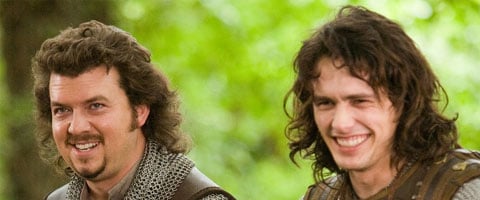
What kind of training did you have to do for swordplay?
James Franco: Well Danny was the writer so he conveniently wrote his character as someone who was very bad at using swords so he didn't have to train at all. I trained a bit, but I had done literally nine months of training, seven days a week for Tristan and Isolde because I was a young actor that didn't know that that was insane. I didn't get to use much of it on that film so I got to use it on this movie.
Danny between Fred Simmons and Kenny Powers and this character you seem to have a comic archetype in the roles that you play, how do you modulate your performance?
Danny McBride: Yeah, you know with all these films, you know when we did The Foot Fist Way that was a really independent film, we shot for 70 grand and we shot it in like 17 days. You know, with that, Jody [Hill] and I hadn't been writing things like that before that movie, and I think we started approaching the story in figuring out that if we could change who the protagonist is and try to get the audience to align with a character that they wouldn't normally align with in films that it opened up all these different comedic possibilities for where the story could go. So with Foot Fist I think we were just starting to scratch the surface with that and we wanted to do more with it but we had just blown our load on this independent film. That's why we set up Eastbound & Down as a to explore that sort of architecture in a story of “Let's take this convenient story and this almost cliched story about an underdog, but let's put the audience with someone that they are not used to following in this kind of story.”
That was kind of the design between those things. When it came time to approach this with the fantasy it became one of those deals of “How do we find our stamp? How do we find our way here?” and it just felt like following your typical hero, well the only way we're going to be able to find comedy then is if we make the fantasy silly, if we make the action silly. So for us, once again it was like shifting that lens of who you typically follow in these films and trying to find someone that's a little bit more unexpected. It just allows you to hit some of those cliched moments with a new perspective. To us that's kind of what was comically interesting about and what separated it from other films that are in this genre.
I think it's just a fine balance, I mean I always come from a place of story so you've gotta just find those layers of how exactly are you going to get an audience to kind of root for someone who is so morally corrupt or who makes these bad choices. So for each character it's kind of like a different thing. You know with Fred Simmons, he's dealing with adultery and loss and betrayal, so it's like 'well how do you have a guy do this but still find redemption.' You know Eastbound it's the same way, you just try to figure out what their wound it and how you can get an audience behind that wound. In this film it was based on sibling rivalry, it was based on someone who felt like he was living in the shadows so it's just a matter of figuring out how can you play around with that and how can you get someone to identify with this person that normally they wouldn't identify with.

Eric Eisenberg is the Assistant Managing Editor at CinemaBlend. After graduating Boston University and earning a bachelor’s degree in journalism, he took a part-time job as a staff writer for CinemaBlend, and after six months was offered the opportunity to move to Los Angeles and take on a newly created West Coast Editor position. Over a decade later, he's continuing to advance his interests and expertise. In addition to conducting filmmaker interviews and contributing to the news and feature content of the site, Eric also oversees the Movie Reviews section, writes the the weekend box office report (published Sundays), and is the site's resident Stephen King expert. He has two King-related columns.
